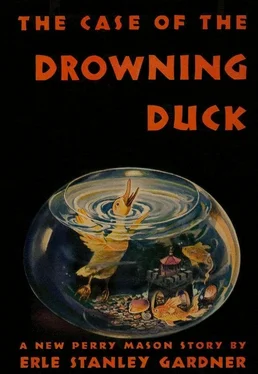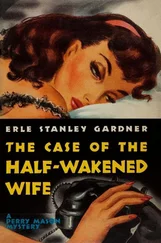Erle Stanley Gardner
The Case of the Drowning Duck
DELLA STREET — secretary extraordinary and alter ego
PERRY MASON — lawyer famous for his lack of interest in ordinary litigation
JOHN L. WITHERSPOON — a rich man with a problem
LOIS WITHERSPOON — his daughter, who knows when she is in love
MARVIN ADAMS — who has doubts about his past but none about Lois
PAUL DRAKE — head of the Drake Detective Agency and a willing backer of any Mason hunch
MRS. ROLAND BURR — a slinky type who’s been around
GEORGE L. DANGERFIELD — a man with respect for his wife’s skill
RAYMOND E. ALLGOOD — detective agency owner
ALBERTA CROMWELL — a woman who suspects she’s scorned
OFFICER HAGGERTY — who makes a distressing discovery
LESLIE L. MILTER — a wiseacre who guessed wrong
SALLY ELBERTON — pretty blond secretary who should have stayed at her desk
MRS. GEORGE L. DANGERFIELD — an expert at dealing with men
LAWRENCE DORMER — defense attorney in need of help
DISTRICT ATTORNEY COPELAND — who thought he had a case
JUDGE MEEHAN — presiding over a strange trial
Once when Della Street, Perry Mason’s private secretary, had asked him what was the most valuable attribute a lawyer could have, Mason had answered, “That peculiar something which makes people want to confide in you.”
Certainly Mason possessed this power to a marked degree. When he walked across a room, people instinctively followed him with their eyes. When he seated himself in a hotel lobby or on a train, persons who were seated next to him almost invariably started a casual conversation and wound up baring their innermost secrets.
As Mason himself had once said, a lawyer either has this quality or he hasn’t. If he has it, it’s as much of a natural gift as having a good ear for music. If he doesn’t have it, he shouldn’t practice law.
Della Street insisted that it was merely the instinctive reaction which people gave to one who could comprehend human frailties, and extend sympathetic understanding.
Mason seldom needed to ask questions. At times, he even seemed uninterested in the confidences which were being poured into his ears. His very indifference stimulated people to go to even greater lengths. But Mason always was understanding and sympathetic. He always made allowances for human weaknesses, and frequently had said that every man who has lived enough to be more than a stuffed shirt, has a closed chapter in his life. If he hasn’t, he isn’t a man.
There on the veranda of the hotel at Palm Springs, Della Street, standing under the steady, unwinking stars which were blotted out here and there by the silhouetted fronds of tall palms, could look into the hotel lobby and see the man who had seated himself next to Perry Mason. She knew, with what amounted to absolute certainty, that this man was getting ready to tell Mason something so important that it had previously been kept as a closely guarded secret.
If Mason realized this, he gave no sign.
He was stretched out comfortably in the deep leather chair, his long legs thrust out before him, the ankles crossed, a cigarette between his lips. His face, usually granite-hard, was relaxed into the grim mask of a fighter who is at rest.
It was only when the man at his side cleared his throat as a preliminary to speech that Mason apparently became aware of his existence.
“I beg your pardon. You’re Mr. Mason, the lawyer, aren’t you?”
Mason didn’t, at once, turn to survey the man’s face. He let his eyes slide obliquely over to look at the other’s legs. He saw black dress trousers that were creased to a knife-like edge, expensive black kid dress shoes that were as soft as gloves.
The man on his right went on, “I’d like to consult you,” and then, after a moment, added, “Professionally.”
Mason turned then all the way for a brief appraisal. He saw a shrewd face with a high forehead, prominent nose, a long, lean mouth which indicated decision, and a chin which was almost too prominent. The eyes were dark, but steady, with the calm confidence of power. The man was in his late forties, and his clothes, his manner, and the fact that he was staying in this particular hotel at Palm Springs indicated wealth.
Any sudden effusive cordiality would have frightened this man as much as too great a reserve would have antagonized him. Mason said simply, “Yes, I’m Mason,” and didn’t so much as offer to shake hands.
“I’ve read quite a lot about you — your cases — in the newspapers — followed them with a great deal of interest.”
“Indeed?”
“I presume you lead a very interesting and exciting life.”
“It’s certainly not monotonous,” Mason agreed.
“And I guess you hear many strange stories.”
“Yes.”
“And are the recipient of many confidences which must, at all costs, be treated as sacred?”
“Yes.”
“My name’s Witherspoon, John L. Witherspoon.”
Even then Mason didn’t extend his hand. He had turned his head back so that the other had only the benefit of his profile. “Live here in California, Mr. Witherspoon?”
“Yes, I have a place down in the Red River Valley, down in the cotton section of the valley — a mighty nice place, fifteen hundred acres.”
He was talking hurriedly now, anxious to get the preliminaries over with.
Mason seemed in no hurry. “Gets rather hot down there in the summer, doesn’t it?” he asked.
“Over a hundred and twenty some of the time. My place is air conditioned. Most of the houses in the valley are. It’s really marvelous what they’re doing to make the desert livable these days.”
Mason said, “It must have a splendid winter climate.”
“It has... I wanted to talk to you about my daughter.”
“You’re staying here at the hotel?”
“Yes. She’s here with me.”
“Been here long?”
“I came up specifically to see you. I read in the Indio paper that you were staying here at Palm Springs. I’ve been studying you for the past hour.”
“Indeed! Drive up?”
“Yes. I don’t want my daughter to know why I’m here or that I’ve consulted you.”
Mason pushed his hands down deep in his trousers pockets. Della Street, watching him through the huge plate-glass window, saw that he didn’t even turn his eyes toward the other. “I don’t like routine cases,” Mason said.
“I don’t think this would be uninteresting — and the fee would be...”
“I like excitement,” Mason interrupted. “Some particular case appeals to me, usually because there’s a mystery connected with it. I start plugging on it, and something develops which leads to excitement. I usually try to cut a corner and get in hot water. It’s the way I’m built. Ordinary office practice doesn’t appeal to me in the least. I have all the work I can do, and I’m not interested in ordinary litigation.”
His very indifference made Witherspoon the more anxious to confide in him. “My daughter Lois is going to marry a young chap who’s going into the Engineering Corps as soon as he finishes college.”
“How old?”
“My daughter or the boy?”
“Both.”
“My daughter’s just twenty-one. The boy’s about six months older. He’s very much interested in chemistry and physics — an unusually bright chap.”
Mason said, “Youth really stands a chance these days.”
“I’m afraid I don’t follow you — not that I’m unpatriotic, but I don’t relish the idea of having a prospective son-in-law sent off to war almost as soon as he gets back from his honeymoon.”
Читать дальше












